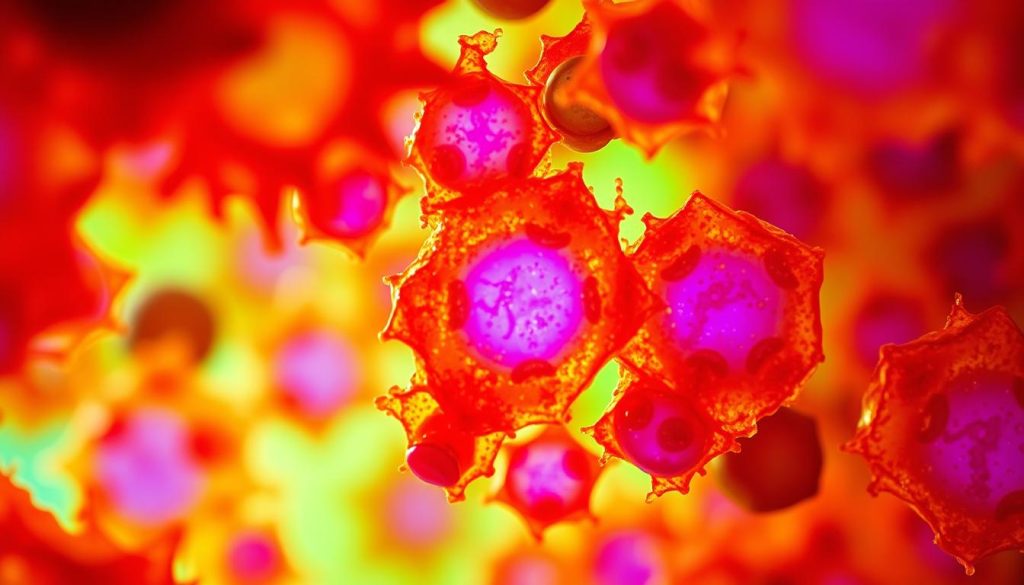Cancer is a complex disease that affects millions of lives worldwide. It happens when cells in the body grow and divide without control, forming tumors. Knowing about cancer is key for early detection and treatment.
The disease can start in different parts of the body, each with its own symptoms. From lung cancer to breast cancer, they all disrupt normal cell function. Spotting the signs of cancer early is critical for better treatment and outcomes.
Let’s dive into what causes cancer, its symptoms, and how it affects health. This information helps people make better choices for their health and supports those with cancer.
What Is Cancer: Basic Understanding of Cell Mutations
Cancer begins with changes in our cells. These changes can cause different types of cancer. Let’s look at how normal cells turn into cancer cells and spread in the body.
Normal Cell Division vs. Cancer Cell Growth
Healthy cells grow and divide in an orderly way. They know when to stop. But cancer cells don’t follow these rules. They keep growing and dividing, even when they shouldn’t.
The Role of DNA Damage in Cancer Development
DNA damage is a key factor in cancer. Our genes control how cells work. When DNA gets damaged, it can cause cell mutations.
These changes can make cells grow out of control. Some things that can harm DNA are:
- Sunlight
- Tobacco smoke
- Certain chemicals
- Viruses
How Cancer Cells Spread Throughout the Body
Cancer spread, or metastasis, happens when cancer cells break away from where they started. They can travel through blood or lymph vessels to other parts of the body. There, they might form new tumors.
| Stage | Description | Spread |
|---|---|---|
| 1 | Small tumor | No spread |
| 2 | Larger tumor | Nearby tissues |
| 3 | Spread to lymph nodes | Local spread |
| 4 | Distant metastasis | Other organs |
Understanding cell mutations and cancer spread helps doctors find better ways to treat and prevent cancer. Early detection is key in fighting many cancer types.
Common Types of Cancer and Their Prevalence
Cancer types vary widely in their prevalence and impact on public health. Understanding the most common cancers helps focus research efforts and improve early detection strategies. Let’s explore the cancer types that affect people most frequently.
Breast cancer is the most diagnosed cancer globally, mainly affecting women. Lung cancer is close behind, linked to smoking. Colorectal cancer is also common, influenced by diet and lifestyle.
Prostate cancer affects men and is the second most common in males worldwide. Skin cancers, including melanoma, are common in areas with lots of sun. The incidence of these cancer types varies across different populations and geographic areas.
| Cancer Type | Estimated New Cases (US, 2021) | Percentage of All New Cancer Cases |
|---|---|---|
| Breast | 284,200 | 15.3% |
| Lung | 235,760 | 12.7% |
| Prostate | 248,530 | 13.4% |
| Colorectal | 149,500 | 8.1% |
| Melanoma | 106,110 | 5.7% |
Factors influencing cancer prevalence include genetics, environmental exposures, and lifestyle choices. Screening programs for breast, colorectal, and cervical cancers have improved early detection rates, potentially affecting their reported prevalence.
Early Warning Signs and Symptoms of Cancer
Spotting cancer symptoms early is key to better treatment. Knowing the warning signs helps people get medical help fast. This leads to early detection and better treatment chances.
Physical Changes to Watch For
Some physical changes might mean cancer is present. Look out for:
- Unexplained weight loss
- Skin changes or new growths
- Persistent cough or hoarseness
- Changes in bowel or bladder habits
- Unusual bleeding or bruising
Systemic Symptoms of Cancer
Cancer can affect the whole body, causing symptoms like:
- Extreme fatigue
- Fever that doesn’t go away
- Night sweats
- Loss of appetite
- General feeling of illness
When to Seek Medical Attention
If you keep getting these warning signs, see a doctor. Early detection is vital for better treatment. Remember, these signs don’t always mean cancer, but it’s wise to check.
| Warning Sign | Duration Before Seeking Help |
|---|---|
| Unexplained weight loss | 2-4 weeks |
| Persistent cough | 3-4 weeks |
| Unusual bleeding | Immediate attention |
| New skin growth | 2-3 weeks if changing |
| Extreme fatigue | 2-3 weeks |
Major Risk Factors Contributing to Cancer Development
It’s key to know what causes cancer and what increases the risk. Some risks we can’t change, but many we can. This helps in preventing cancer.
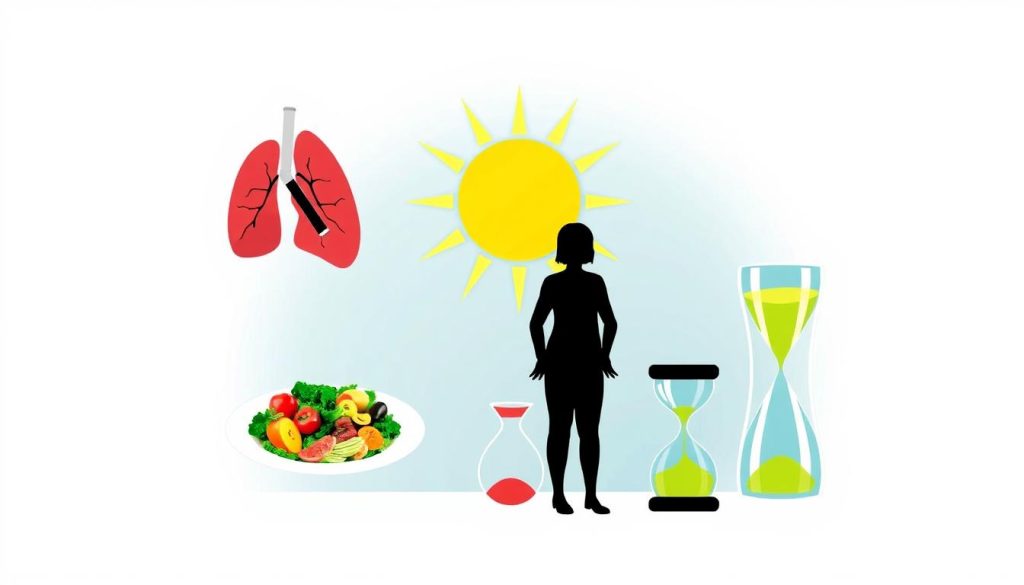
Lifestyle choices are big in cancer development. Smoking is a top cause of lung cancer and other cancers too. Drinking too much alcohol raises the risk of liver, breast, and colon cancers.
What we eat and how active we are also matter. Eating too much processed food and red meat can up cancer risk. But, exercising often and staying at a healthy weight can help lower it.
Environmental factors are another risk. Too much sun without protection can cause skin cancer. Some work chemicals and pollutants can also lead to cancer.
| Risk Factor | Associated Cancer Types | Prevention Strategy |
|---|---|---|
| Smoking | Lung, Throat, Mouth | Quit smoking, avoid secondhand smoke |
| Excessive Alcohol | Liver, Breast, Colorectal | Limit alcohol consumption |
| Obesity | Breast, Colon, Pancreatic | Maintain healthy weight, exercise regularly |
| UV Radiation | Skin | Use sunscreen, limit sun exposure |
Genetics also play a part in cancer risk. If your family has a history of certain cancers, you might be at higher risk. This is why screenings and genetic counseling are so important.
Knowing these risk factors helps us make better choices. We can change our lifestyle and health habits to lower our cancer risk.
Understanding Cancer Staging and Grading Systems
Cancer staging and grading are key in planning treatments and predicting results. They help doctors see how far cancer has grown and if it might spread.
TNM Classification Explained
The TNM classification is a common way to stage cancer. T stands for tumor size, N for lymph node involvement, and M for metastasis. Each part gets a number or letter to show how serious it is.
Different Stage Levels and Their Meanings
Cancer stages go from 0 to IV. Stage 0 means abnormal cells that haven’t spread. Stages I to III show tumors getting bigger and spreading to nearby tissues. Stage IV means cancer has reached distant parts of the body.
| Stage | Description |
|---|---|
| 0 | Abnormal cells, no spread |
| I | Small tumor, localized |
| II-III | Larger tumor, possible spread to nearby tissues |
| IV | Spread to distant organs |
Impact of Staging on Treatment Decisions
Cancer grading looks at how abnormal cells appear under a microscope. This, along with staging, helps decide treatment. Early-stage cancers might just need surgery. But for more advanced stages, treatments like chemotherapy and radiation are often used together.
Knowing about cancer stages helps both patients and doctors make better treatment choices. It also helps talk about what to expect. Regular check-ups and screenings can catch cancer early, leading to better chances of recovery.
Modern Cancer Detection and Diagnostic Methods
Cancer detection has made huge strides, thanks to advanced diagnostic methods. These methods have changed how we find and treat cancer. Early screening is key to better patient outcomes. Let’s look at some of the latest techniques doctors use today.
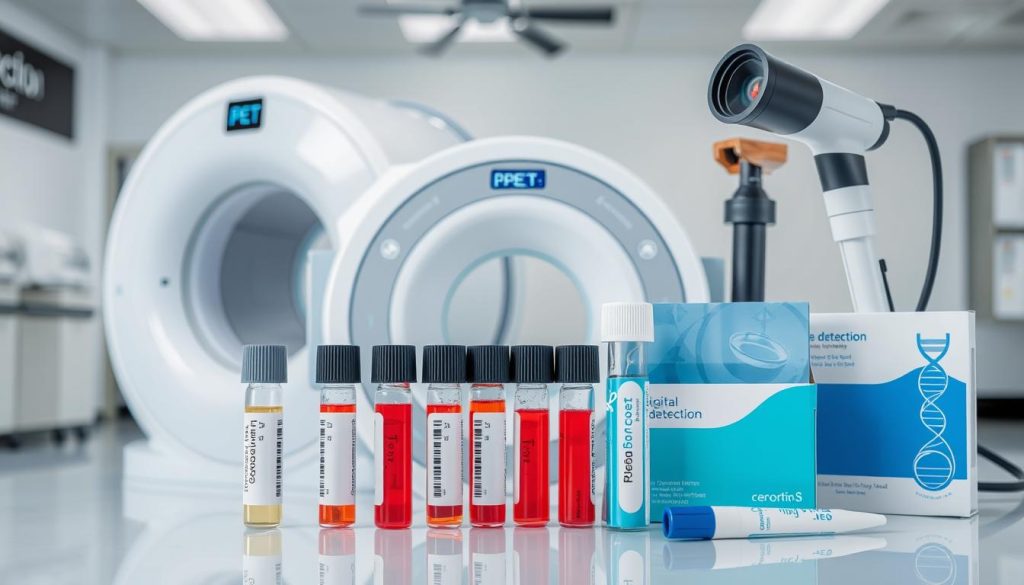
Imaging technologies have greatly improved cancer screening. CT scans, MRIs, and PET scans show detailed images of inside the body. They help doctors find tumors early, often before symptoms show.
Liquid biopsies are a big step forward in cancer detection. They analyze blood samples for tumor cells or DNA. This method is less invasive than traditional biopsies and can find cancer early.
Genetic testing is now a big part of cancer screening. Doctors look at a person’s DNA to find genetic mutations linked to cancer. This helps create personalized screening plans and early intervention strategies.
| Diagnostic Method | Description | Benefits |
|---|---|---|
| Imaging Technologies | CT, MRI, PET scans | Non-invasive, detailed internal views |
| Liquid Biopsies | Blood sample analysis | Less invasive, early detection |
| Genetic Testing | DNA examination | Personalized screening plans |
These modern methods, along with regular check-ups, greatly improve early diagnosis and treatment chances. Knowing about these tools helps people take charge of their health.
Traditional Cancer Treatment Approaches
Cancer treatment has changed a lot over time. But, old methods are key in the fight against cancer. These methods aim to get rid of cancer cells without harming healthy tissue too much.
Surgery Options and Procedures
Surgery is often the first step against solid tumors. Surgeons take out cancerous growths and some nearby tissue to stop it from spreading. Bone marrow cancer might need special surgery because of its unique nature. There are different types of cancer surgery:
- Resection: Removing the tumor and surrounding tissue
- Debulking: Partial tumor removal when complete removal is not possible
- Palliative: Easing symptoms without curing the cancer
Chemotherapy Protocols
Chemotherapy uses drugs to kill cancer cells all over the body. It’s given in cycles to let the body recover. Common chemotherapy protocols include:
- Adjuvant: Given after surgery to kill remaining cancer cells
- Neoadjuvant: Used before surgery to shrink tumors
- Combination: Multiple drugs used together for better results
Radiation Therapy Types
Radiation therapy uses high-energy beams to kill cancer cells. It can be given from outside or inside the body. Types of radiation therapy include:
| Type | Description | Common Uses |
|---|---|---|
| External Beam | Radiation from a machine outside the body | Breast, prostate, lung cancers |
| Brachytherapy | Radioactive material placed inside the body | Cervical, prostate cancers |
| Systemic | Radioactive drugs taken by mouth or injection | Thyroid cancer, bone metastases |
Each cancer treatment has its own good and bad sides. Doctors often mix these methods for the best results. They make treatment plans that fit each patient’s needs.
Breakthrough Cancer Therapies and Innovations
Cancer research has made huge strides in treatment options. New treatments are changing how we fight cancer, giving patients new hope. These new methods focus on being precise and effective, reducing side effects seen in old treatments.
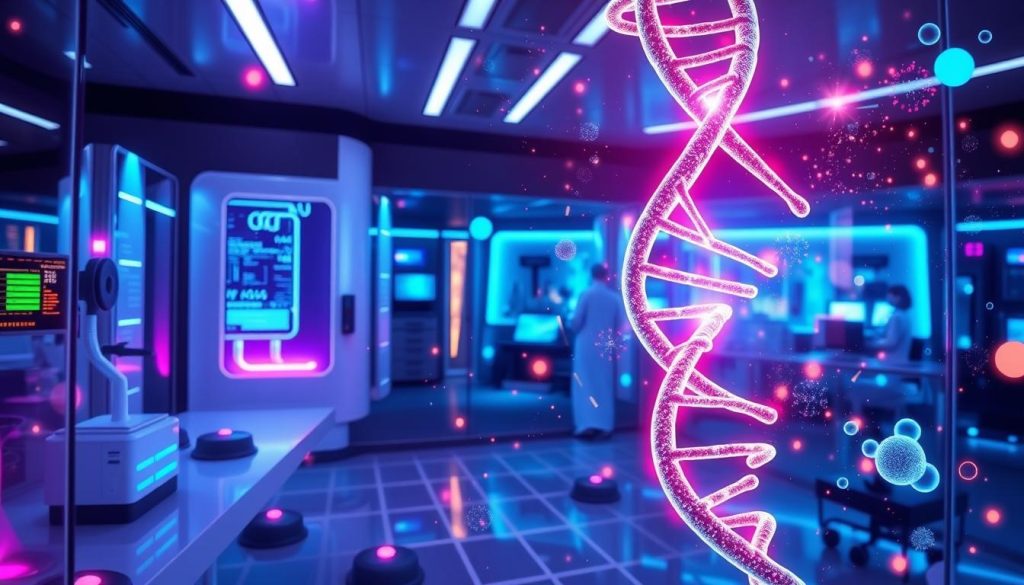
Immunotherapy is a major breakthrough. It uses the body’s immune system to fight cancer cells. It has shown great promise in treating cancers like melanoma and lung cancer.
Targeted therapies are another big step forward. These drugs target specific genetic mutations that cause cancer. By focusing on cancer’s molecular level, they can be more effective and safer for healthy cells.
Precision medicine tailors treatments to each patient’s genetic makeup. This personalized approach ensures patients get the best treatment for their cancer type.
| Therapy Type | Description | Benefits |
|---|---|---|
| Immunotherapy | Boosts immune system to fight cancer | Long-lasting remissions in some cases |
| Targeted Therapies | Attacks specific cancer-causing mutations | Fewer side effects than traditional chemo |
| Precision Medicine | Tailored treatment based on genetic profile | Improved efficacy and patient outcomes |
These new methods are changing cancer care. As research keeps going, we’ll see even more new treatments. This will help us manage cancer better and maybe even find cures.
Cancer Prevention Strategies and Lifestyle Changes
Controlling your health through lifestyle changes can greatly lower your cancer risk. By adopting healthy habits and making smart choices, you can actively prevent cancer.
Dietary Modifications for Cancer Prevention
Eating a balanced diet is essential for cancer prevention. Focus on fruits, vegetables, and whole grains. Avoid processed meats and choose lean proteins like fish and poultry.
Include foods rich in antioxidants, such as berries and leafy greens. These help protect your body from harmful free radicals.
Exercise and Physical Activity Guidelines
Regular exercise is vital for cancer prevention. Aim for 150 minutes of moderate exercise or 75 minutes of vigorous exercise weekly. Activities like brisk walking, swimming, or cycling are great.
Staying active helps keep a healthy weight and boosts your immune system.
Environmental Risk Reduction
Reducing exposure to environmental toxins is important. Avoid tobacco smoke and limit alcohol. Also, protect your skin from too much sun.
Be mindful of workplace hazards and use protective gear when needed.
By adopting these cancer prevention strategies and making lifestyle changes, you can improve your health. Remember, small daily changes can lead to big benefits in reducing cancer risk.
Genetic Factors and Hereditary Cancer Risks
Genetic factors are key in cancer development. Some people inherit genes that make them more likely to get certain cancers. Knowing your family history is very important.
Scientists have found genes that increase cancer risk. For example, BRCA1 and BRCA2 genes are linked to breast and ovarian cancers. Lynch syndrome genes are connected to colorectal and endometrial cancers.
If your family has a history of cancer, genetic counseling can help. Counselors look at your family history and might suggest genetic testing. This helps you make choices about preventing and detecting cancer early.
| Gene Mutation | Associated Cancer Types | Lifetime Risk Increase |
|---|---|---|
| BRCA1/2 | Breast, Ovarian | Up to 70% |
| Lynch Syndrome | Colorectal, Endometrial | Up to 80% |
| TP53 (Li-Fraumeni) | Various | Nearly 100% |
Genetic factors do increase cancer risk, but they don’t mean you’ll definitely get cancer. Lifestyle and environment also matter. Knowing your genetic risk and living healthily can lower your cancer risk.
Impact of Cancer on Mental Health and Well-being
Cancer does more than harm our bodies. It also affects our mental health. Many people feel anxious, depressed, and stressed when they have cancer. It’s important to understand these challenges to provide the best care.
Coping Mechanisms for Patients
Finding ways to cope is key for managing mental health with cancer. Some good strategies include:
- Mindfulness meditation
- Regular exercise
- Journaling
- Creative activities like art or music
- Joining support groups
These methods can help keep emotions stable and improve life quality during treatment and recovery.
Support Systems and Resources
A strong support network is essential for cancer patients. There are many types of support:
- Family and friends
- Professional counseling
- Cancer support organizations
- Online communities
- Hospital social services
These resources offer emotional support, practical help, and important information. They are key in helping patients deal with the challenges of cancer care and mental health.
Latest Cancer Research and Clinical Trials
Cancer research is moving fast, bringing new hope to patients. New clinical trials and treatments are being tested. Scientists are finding ways to fight cancer better and with fewer side effects.
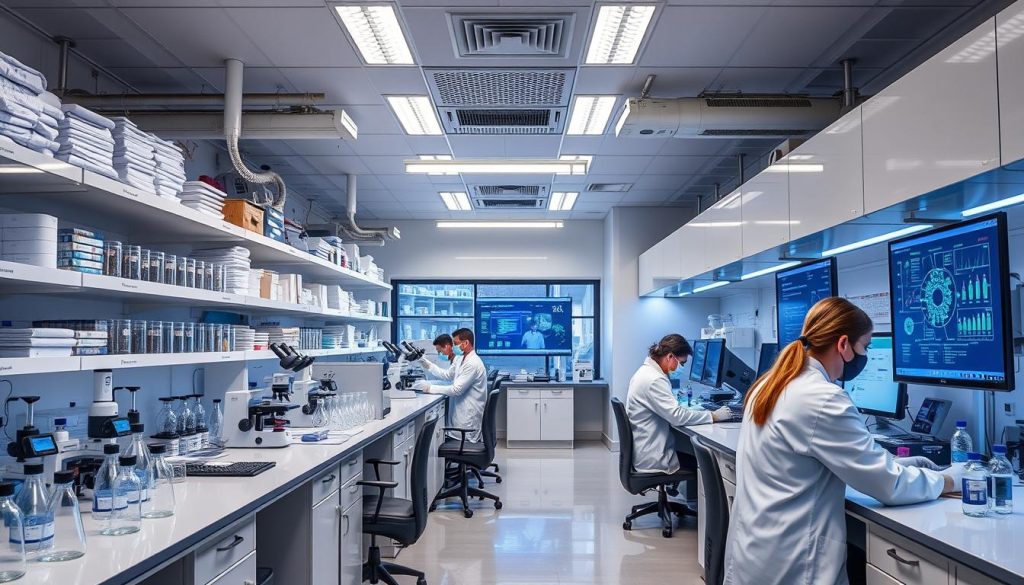
Immunotherapy is leading the way in cancer research. It uses the body’s immune system to attack cancer cells. Trials are looking at new immune treatments and CAR T-cell therapies, showing great promise.
Gene therapy is also making waves. It aims to fix or replace genes that cause cancer. These therapies target cancer at its source.
Personalized medicine is changing how we treat cancer. Doctors use genetic analysis to create treatments just for each patient. This makes treatments more effective and reduces side effects.
| Research Area | Potential Benefits | Current Stage |
|---|---|---|
| Immunotherapy | Enhanced immune response against cancer | Advanced clinical trials |
| Gene Therapy | Targeted correction of cancer-causing genes | Early-stage clinical trials |
| Personalized Medicine | Tailored treatments for individual patients | Implemented in some cancer centers |
These new treatments offer hope for better cancer care. As research and trials continue, we’re getting closer to more effective and less invasive treatments.
Global Cancer Statistics and Trends
Cancer is a big health problem worldwide. It affects many people. In recent years, the number of cancer cases has changed in different parts of the world. Knowing the early signs of lung cancer and other cancers is key to better treatment.
Survival Rates by Cancer Type
Survival rates vary with each cancer type. Breast and prostate cancers often have better survival rates. But, pancreatic and lung cancers have lower rates. This is because of how early we can find these cancers and the treatments available.
Geographic Distribution of Cancer Cases
Cancer is not spread evenly around the world. Countries with more money usually have more cancer cases. This is because they can screen for cancer more and people live longer. But, poor countries struggle to find and treat cancer. This shows we need better ways to fight cancer globally.
It’s important to understand cancer trends worldwide. By looking at cancer statistics and survival rates, we can improve health care. This way, we can save more lives all over the world.
FAQ
Q: What is cancer?
A: Cancer is a disease where cells grow out of control. They can spread to other parts of the body. This happens when cells divide too much because of DNA damage.
Q: What are the most common types of cancer?
A: Common cancers include breast, lung, colorectal, and prostate cancer. These cancers are diagnosed a lot worldwide. The risk depends on age, gender, and where you live.
Q: What are the early warning signs of cancer?
A: Signs of cancer include unexplained weight loss and fatigue. Fever, pain, skin changes, and changes in bowel or bladder habits are also signs. If you notice these, see a doctor right away.
Q: What are the major risk factors for developing cancer?
A: Risk factors include smoking, drinking too much alcohol, and unhealthy eating. Not moving enough and being exposed to harmful chemicals also increase risk. Some of these can be changed, showing the importance of lifestyle.
Q: How is cancer staged?
A: Cancer staging uses the TNM system (Tumor, Node, Metastasis). It shows how far the cancer has spread. This helps doctors decide on treatment and gives a better idea of how the patient will do.
Q: What are the main treatment options for cancer?
A: Treatments include surgery, chemotherapy, and radiation therapy. They might be used alone or together, based on the cancer type and stage. New treatments like immunotherapy and targeted therapies are also being used.
Q: Can cancer be prevented?
A: While not all cancers can be prevented, many can be reduced. Eating well, exercising, avoiding tobacco, and limiting alcohol can help. Regular screenings can also help find cancer early.
Q: How does genetics influence cancer risk?
A: Genetics can greatly affect cancer risk. Some people inherit genes that make them more likely to get certain cancers. Knowing your family history and getting genetic testing can help identify risks.
Q: What impact does cancer have on mental health?
A: Cancer can really affect mental health, causing anxiety, depression, and stress. Patients may feel many emotions during their journey. Support groups and mental health services are key in dealing with these feelings.
Q: What are some breakthrough cancer therapies?
A: New therapies include immunotherapy, targeted therapies, and precision medicine. These treatments are showing great promise in improving patient outcomes. They work by attacking cancer cells in new ways.
Q: How can I participate in cancer clinical trials?
A: To join cancer clinical trials, talk to your oncologist or search online. You can also contact cancer research centers. Trials offer new treatments and help advance cancer research.
Q: What are the global trends in cancer statistics?
A: Cancer rates are going up in many places, due to more people living longer and better detection. But, thanks to new treatments, survival rates are also improving. Where you live affects your cancer risk, due to lifestyle, environment, and healthcare.












